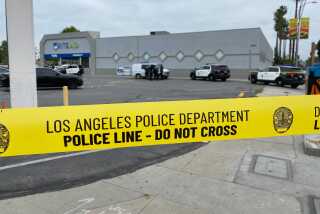Editorial: Of course police should kill only when necessary. California law should reflect that
Police officers should be able to use deadly force only when necessary to prevent death or serious injury to themselves or to others.
That standard seems so logical and so based in common sense that it may come as a surprise that it’s not already the law. It ought to be, and a bill currently before California lawmakers would make it so. Assembly Bill 392 is a measured piece of legislation to improve police practices and enhance accountability. It deserves to pass.
Under current law, you need only to show that another “reasonable” police officer would have made the same decision to use force, but not that all reasonable alternatives had been exhausted.
The basic premise of shooting only when there are no reasonable non-deadly alternatives already underlies police practices in a number of cities. It is the explicit rule of engagement, for example, in San Francisco, and is in effect ingrained in the training and review standards of the Los Angeles Police Department. Even as police groups argue against the bill, some departments across the country are moving toward the only-when-necessary rule.
This bill would make it the standard for every department in California.
And it would apply that standard not just to disciplinary rules that determine whether an officer should be fired for misconduct or grievous errors, and not just to liability guidelines that dictate when a victim or survivors can sue and recover monetary damages.
Assembly Bill 392 is a measured piece of legislation to improve police practices and enhance accountability. It deserves to pass.
It would also apply in the criminal context. Officers who misuse deadly force could be held criminally liable for manslaughter (although not for murder).
That brings police officer conduct closer to the standards we expect from others in society in the performance of their duties or daily activities. Surgeons, for example, can be held liable for criminal negligence if they botch an operation because of conduct that was wildly reckless. Even a nonprofessional can be criminally prosecuted — for example, if a driver gets behind the wheel while intoxicated.
Police officers constantly put themselves in harm’s way to protect the public and should be accorded a measure of deference, especially when they are trying to arrest a person perceived to be armed and dangerous.
But even police should be held to account when their own actions unnecessarily exacerbate the danger — for example, when they are warned that a man is having a mental breakdown alone inside a house and they immediately (and unnecessarily) enter, provoke the man and shoot him when it appears he may have a weapon. In that case, officers might have chosen from a number of deescalation options, including persuasion, without entering the house and putting themselves and the person in danger.
Backers and opponents alike argue that the bill represents a departure from rules set by the U.S. Supreme Court in the 1980s, but that’s only partly true. In Tennessee vs. Garner, the court ruled that an officer couldn’t shoot a fleeing suspect just to prevent his escape, unless there was good reason to believe the person would put the officer or others in danger. AB 392 is very much in the spirit of that ruling.
But several years later the court ruled, in Graham vs. Connor, that because officers do dangerous work requiring split-second thinking, their actions should be judged by what any objectively reasonable officer on the scene might have done.
Enter the Fray: First takes on the news of the minute »
But that’s a kind of circular standard: When is it reasonable for a police officer to use deadly force? Whenever other reasonable police officers would have done the same thing.
The “necessary” standard embodied in the California bill makes it clear that officers must consider nonlethal alternatives, and must keep in mind how their own actions leading up to the encounter might exacerbate the danger.
Of course, police must still make split-second decisions in dangerous situations. The new law would not require discipline or prosecution if, for example, a suspect points a gun and the officer shoots in self-defense, only to learn after the fact that the gun was not loaded. The law would not require officers to become omniscient mind-readers. Rules of reasonableness would still apply: Would a reasonable officer in the same situation believe it was necessary to use deadly force?
Contrary to the rhetoric of some proponents who measure justice for police shooting victims by the number of convicted officers, this bill’s chief asset is not that it will send bad officers to prison, although it may eventually do that. It’s that it will make good and middling officers better by raising the standards of professional conduct. It will hold all officers accountable — and by the way, it may do the same for prosecutors, who ultimately decide how to enforce the law.
Follow the Opinion section on Twitter @latimesopinion and Facebook.
More to Read
A cure for the common opinion
Get thought-provoking perspectives with our weekly newsletter.
You may occasionally receive promotional content from the Los Angeles Times.










